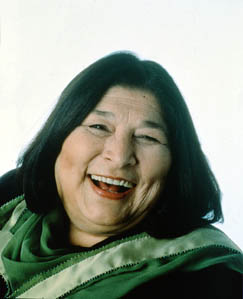| B i o g r a p h y |
 Mercedes Sosa
(born 9 July 1935) is an Argentine singer immensely popular throughout
Latin America. With her roots in Argentine folk music, she became one
of the preeminent exponents of nueva canción. Sosa is greatly admired
for the depth and beauty of her contralto voice. She is nicknamed "La
Negra" by her fans for her long, jet-black hair. She is best known as
the voice of the "voiceless ones". Sosa was born in San Miguel de
Tucumán, in the northwestern province of Argentina, of mestizo descent
from French and Amerindian (Quechuan) ancestry. In 1950, at age
fifteen, she won a singing competition organized by a local radio
station and was given a contract to perform for two months. Sosa and
her first husband, Manuel Oscar Matus, with whom she has one son, were
key players in the mid-60s nueva canción movement (which was called
nuevo cancionero in Argentina). Her first record was Canciones con
Fundamento, a collection of Argentine folk songs.
Mercedes Sosa
(born 9 July 1935) is an Argentine singer immensely popular throughout
Latin America. With her roots in Argentine folk music, she became one
of the preeminent exponents of nueva canción. Sosa is greatly admired
for the depth and beauty of her contralto voice. She is nicknamed "La
Negra" by her fans for her long, jet-black hair. She is best known as
the voice of the "voiceless ones". Sosa was born in San Miguel de
Tucumán, in the northwestern province of Argentina, of mestizo descent
from French and Amerindian (Quechuan) ancestry. In 1950, at age
fifteen, she won a singing competition organized by a local radio
station and was given a contract to perform for two months. Sosa and
her first husband, Manuel Oscar Matus, with whom she has one son, were
key players in the mid-60s nueva canción movement (which was called
nuevo cancionero in Argentina). Her first record was Canciones con
Fundamento, a collection of Argentine folk songs.
In 1967, Sosa toured with great success the United States and Europe. In subsequent years, she performed and recorded extensively, broadening her repertoire to include material from throughout Latin America. In the early 1970s, Sosa released two concept albums in collaboration with composer Ariel Ramírez and lyricist Félix Luna: Cantata Sudamericana and Mujeres Argentinas (Argentine Women). She also recorded a tribute to Chilean poet Violeta Parra. A supporter of Perón in her youth, she has favored leftist causes throughout her life. After the military junta of Jorge Videla came to power in 1976, the atmosphere in Argentina grew increasingly oppressive. At a concert in La Plata in 1979, Sosa was searched and arrested on stage, along with the attending crowd. Banned in her own country, she moved to Paris and then to Madrid. Her second husband died in 1978.
Sosa returned to Argentina in 1982, several months before the military regime collapsed as a result of the Falklands War, and gave a series of concerts at the Opera theater in Buenos Aires, where she invited many of her younger colleagues to share the stage. A double album of recordings from these performances became an instant best seller. In the following years, Sosa continued to tour both in Argentina and abroad, performing in such venues as the Lincoln Center, Carnegie Hall and the Mogador in París. Sosa's repertoire continued to broaden, and she made recordings in various styles. She collaborated frequently with many musicians such as Luciano Pavarotti, Sting, Lucio Dalla, Nana Mouskouri, Joan Baez, Andrea Bocelli, Silvio Rodríguez, Pablo Milanés, Milton Nascimento, Caetano Veloso, Chico Buarque, Gal Costa, Gian Marco, Konstantin Wecker, Nilda Fernández, Pata Negra, David Broza, Franco Battiato, Luz Casal, Ismael Serrano.
Sosa participated in a 2001 production of the Misa Criolla by Ariel Ramírez. She opposed the Argentine president Carlos Menem who was in office from 1989 to 1999. She supported the election of Néstor Kirchner who became president in 2003. Sosa is UNESCO Goodwill Ambassador for Latin America and the Caribbean. She has won the Latin Grammy Award for Best Folk Album in 2000 ("Misa Criolla"), 2003 ("Acustico") and 2006 ("Corazon Libre"), as well as many international awards.